

Study shows why young punks grow to like classical and jazz in older age : science. Allowing people to see their own brain activity might help them motivate themselves. At our best, we motivate ourselves every day to get dressed and go to work or school.

Although there are larger incentives at work, it’s our own volition that powers us through our innumerable daily tasks. If we could learn to control the motivational centers of our brains that drive volition, would it lead us toward healthier, more productive lives? Using a new brain imaging strategy, Duke University scientists have now taken a first step in understanding how to manipulate specific neural circuits using thoughts and imagery. “These methods show a direct route for manipulating brain networks centrally involved in healthy brain function and daily behavior,” said the study’s senior investigator R. Alison Adcock, an assistant professor of psychiatry and behavioral sciences and associate director of the Center for Cognitive Neuroscience in the Duke University Institute for Brain Sciences. Gabriel Kreiman Tests Free Will with Single-Neuron Measurements of Pre-Conscious Activity. It was an expedition seeking something never caught before: a single human neuron lighting up to create an urge, albeit for the minor task of moving an index finger, before the subject was even aware of feeling anything.

Four years ago, Itzhak Fried, a neurosurgeon at the University of California, Los Angeles, slipped several probes, each with eight hairlike electrodes able to record from single neurons, into the brains of epilepsy patients. Motivate People! On the Benefits of Failure.
Can a Playground Be Too Safe? Boosting Self-Worth Can Counteract Cognitive Effects of Poverty. News For people in poverty, remembering better times — such as past success — improves cognitive functioning by several IQ points and increases their willingness to seek help from crucial aid services, a new study finds.
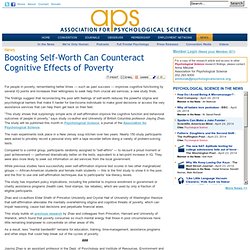
The findings suggest that reconnecting the poor with feelings of self-worth reduces the powerful stigma and psychological barriers that make it harder for low-income individuals to make good decisions or access the very assistance services that can help them get back on their feet. “This study shows that surprisingly simple acts of self-affirmation improve the cognitive function and behavioral outcomes of people in poverty,” says study co-author and University of British Columbia professor Jiaying Zhao.
The study will be published this month in Psychological Science, a journal of the Association for Psychological Science. The main experiments took place in a New Jersey soup kitchen over two years. Children with low self-esteem are often praised for personal qualities instead of efforts. (Medical Xpress)—Praising children, especially those with low self-esteem, for their personal qualities rather than their efforts may make them feel more ashamed when they fail, according to new research published by the American Psychological Association.

"This type of personal praise may backfire. What may seem like common sense can sometimes lead adults astray in their attempts to help children with low self-esteem feel better about themselves," said lead researcher Eddie Brummelman, MS, of Utrecht University in the Netherlands. The study was published online in the Journal of Experimental Psychology : General . The study found that children with low self-esteem often received praise for their personal qualities, and that type of praise can trigger greater feelings of shame from failure and may lead to a diminished sense of self-worth. 3-second distraction doubles work errors. MICHIGAN STATE (US) — Even tiny interruptions can derail your train of thought and increase mistakes, new research shows.
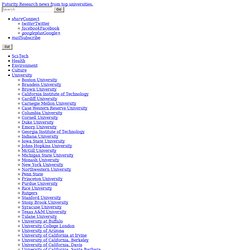
Short interruptions—such as the few seconds it takes to silence that buzzing smartphone—have a surprisingly large effect on one’s ability to accurately complete a task, according to new research. The study, in which 300 people performed a sequence-based procedure on a computer, found that interruptions of about three seconds doubled the error rate. Brief interruptions are ubiquitous in today’s society, from text messages to a work colleague poking his head in the door and interrupting an important conversation. But the ensuing errors can be disastrous for professionals such as airplane mechanics and emergency room doctors, says Erik Altmann, lead researcher on the study and associate professor of psychology at Michigan State University. GPA may be contagious in high-school social networks.
High school students whose friends' average grade point average (GPA) is greater than their own have a tendency to increase their own GPA over the course of a year, according to research published February 13 in the open access journal PLOS ONE by Hiroki Sayama from Binghamton University and his collaborators from Maine-Endwell High School in Endwell, New York, including four high school student researchers.
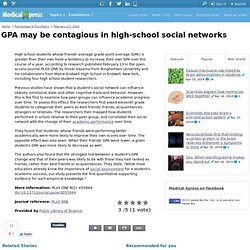
Previous studies have shown that a student's social network can influence obesity, emotional state and other cognitive traits and behavior. However, this is the first to examine how peer groups can influence academic progress over time. To assess this effect, the researchers first asked eleventh grade students to categorize their peers as best friends, friends, acquaintances, strangers or relatives. Hitting streaks in baseball may be contagious. The ‘Facebook Class’ Built Apps, and Fortunes. Jim Wilson/The New York Times B.J.

3 Ways to Enhance Your Willpower. To Stop Procrastinating, Look to Science of Mood Repair. Burnout. The indispensable research blog on the science of the modern workplace, covering everything from leadership and management to the behavioral, social, and cognitive dynamics behind performance and achievement.
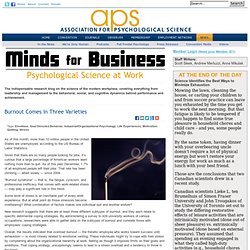
Google is right: We work better when we're happy. New research confirms what Google already knows—greater employee happiness results in higher productivity without sacrificing quality.
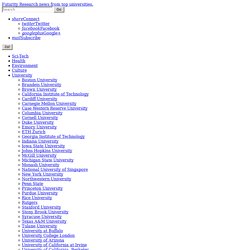
Economists carried out a number of experiments to test the idea that happy employees work harder. In the laboratory, they found happiness made people about 12 percent more productive. Andrew Oswald, Eugenio Proto, and Daniel Sgroi from the Department of Economics at the University of Warwick led the research. Cash vs. happiness? Show me the money.